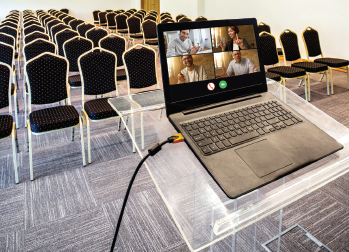
© Drazen Zigic / shutterstock.com
With the COVID-19 pandemic curtailing travel and preventing large gatherings, professional otolaryngology and physician societies have had to cancel meetings or quickly take them online. “Replacing meetings virtually is better than doing nothing, but people are anxious to have in-person meetings again. It’s definitely been missed,” said Michael Stewart, MD, vice dean and chairman of the department of otolaryngology–head and neck surgery at Weill Cornell Medicine in New York City and executive vice president of the American Rhinologic Society.
Explore This Issue
September 2020The pandemic may have a lasting impact on the future of medical societies, as well as the ways in which physicians gather to present research, collaborate, and even recruit residents, fellows, and faculty. It’s also possible that some of those societies may not weather the storm.
Why In-Person Meetings Are Important
Although Zoom and Webex have been around for years, in-person meetings allow for experiences that may be impossible to replicate online alone, including panel discussions that allow for detailed questions, informal learning from colleagues and peers in a social setting, and generally catching up with the latest advances in the field.
“The essence of the meeting is to weave together community and content,” said Albert L. Merati, MD, surgeon and chief of laryngology at the University of Washington in Seattle and past president of the American Broncho-Esophagological Association (ABEA) and American Academy of Otolaryngology–Head and Neck Surgery (AAO-HNS). “You cannot focus on content and lose sight of community, and vice versa.” Dr. Merati added that the reason the ABEA’s completely virtual 100th annual meeting this year was a big success was because it focused not just on papers, but on connecting its members virtually.
For residents who are interested in fellowships, society meetings are a place where we can sit down, have a cup of coffee, and just chat about things in a more informal way. I’m going to be very curious to see how this impacts our match coming up. —Gaelyn Garrett, MD, MMHC
Another reason many otolaryngologists enjoy meeting in person is that while some subspecialties like pediatrics may have hundreds of thousands of doctors, Dr. Stewart said, otolaryngology is a small, tight-knit subspecialty of about 11,000. “Our meetings are large but not unwieldy,” he said. “The size of our specialty means our meetings are particularly enjoyable because of the possibility of knowing a lot more people. The missed connections part of not having in-person meetings is going to be more acutely felt.”
In-person society meetings are valuable for a variety of career and personal reasons, including:
Recruitment. Meetings offer recruitment opportunities, particularly in academic medicine. Young residents and fellows attend to look for first jobs; national meetings are opportunities for face-to-face interviews.
“It’s a great ‘first date’ to decide who you may want to invite for an in-person visit to your facility,” said Dr. Stewart, who set aside several hours to meet with multiple candidates last year and decide who his team would invite to New York for interviews. “We’re going to miss the opportunity to meet potential faculty members, and I’m sure the residents are going to have the same experience.”
Gaelyn Garrett, MD, MMHC, vice chair for clinical operations at Nashville-based Vanderbilt University Medical Center’s department of otolaryngology and president of the Triological Society, believes the majority of residency programs aren’t holding in-person interviews this year, something she says is a game changer on both sides. Dr. Garrett, director of the laryngology fellowship at Vanderbilt, said the program made it about halfway through in-person interviews this year before conducting the remainder virtually. “You lose that close person-to-person interaction. For residents who are interested in your fellowships, society meetings are a place where we can sit down, have a cup of coffee, and just chat about things in a more informal way. I’m going to be very curious to see how this impacts our match coming up.”